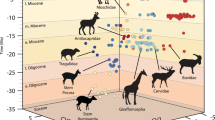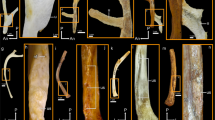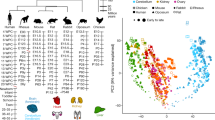Abstract
Dumont and Rifkind recently proposed that the New World monkey, the sloth and the bat have evolved only a rudimentary form of thoracic duct because these animals hang upside down from trees1. Whether or not this proposition is correct, it seems to me that the authors have reached their interesting conclusion by a devious and sometimes misleading argument.
This is a preview of subscription content, access via your institution
Access options
Subscribe to this journal
Receive 51 print issues and online access
$199.00 per year
only $3.90 per issue
Buy this article
- Purchase on Springer Link
- Instant access to full article PDF
Prices may be subject to local taxes which are calculated during checkout
Similar content being viewed by others
References
Dumont, A. E., and Rifkind, K. M., Nature, 219, 1182 (1968).
Hall, J. G., Morris, B., and Woolley, G., J. Physiol., 180, 336 (1965).
Yoffey, J. M., and Courtice, F. C., Lymphatics, Lymph and Lymphoid Tissue (Edward Arnold, London, 1956).
Rusznyak, I., Földi, M., and Szabo, G., Lymphatics and Lymph Circulation (Pergamon Press, Oxford, 1960).
Author information
Authors and Affiliations
Rights and permissions
About this article
Cite this article
HALL, J. Evolutionary Significance of the Thoracic Duct. Nature 220, 910–911 (1968). https://doi.org/10.1038/220910a0
Received:
Issue Date:
DOI: https://doi.org/10.1038/220910a0
This article is cited by
-
Laser-induced Acoustic Breakage of Tobacco Mosaic Virus
Nature (1969)
Comments
By submitting a comment you agree to abide by our Terms and Community Guidelines. If you find something abusive or that does not comply with our terms or guidelines please flag it as inappropriate.



